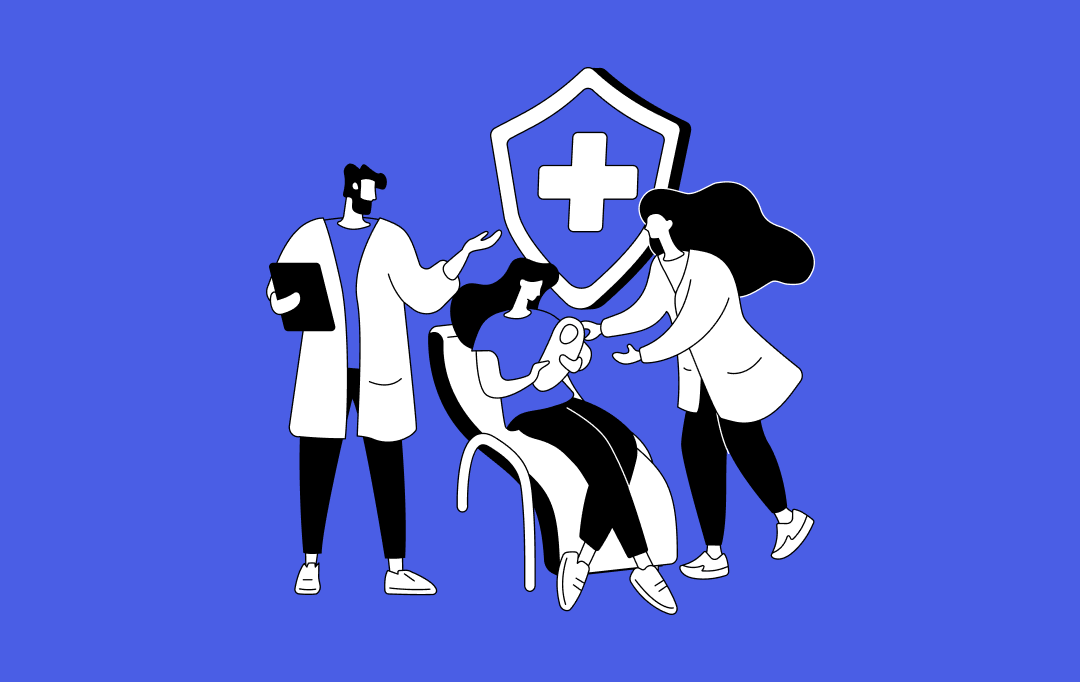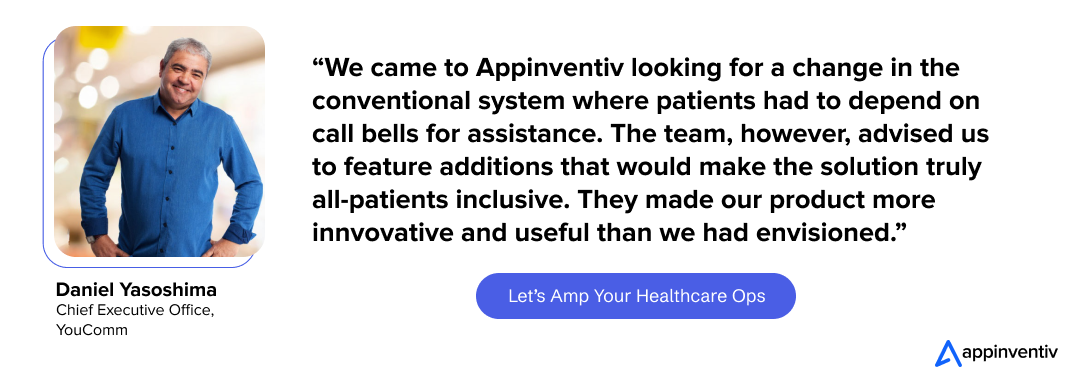- Managed Services in Healthcare
- Why Do You Need Managed IT Services for Healthcare?
- 10 Use Cases of Managed IT Services For Healthcare
- 1. Management of Electronic Health Records (EHR)
- 2. Cybersecurity and Data Protection
- 3. Telehealth Infrastructure Management
- 4. IT Support for Medical Devices
- 5. Network Optimization and Support
- 6. Cloud Solutions for Healthcare
- 7. Compliance Management
- 8. Help Desk and Technical Support
- 8. Business Continuity and Disaster Recovery
- 9. Analytics and Business Intelligence
- Real-World Examples of Managed IT Services in Healthcare
- 1. YouCOMM LLC
- 2. Apollo Hospitals
- 3. Mayo Clinic
- 4. NHS (National Health Service), UK
- Key Considerations for Choosing a Managed IT Service Provider
- 1. Expertise in Healthcare IT
- 2. Customization and Scalability
- 3. 24/7 Support
- 4. Compliance and Security
- Appinventiv: Building a Smarter, Safer Healthcare System
- FAQs
A hospital or healthcare center has many things, like accessing patients’ medical history, checking real-time lab results, and managing endless billing cycles to look after simultaneously. Managing all these together can cause chaos, leading to operational failure and bad patient experience. Addressing this healthcare hustle is not an easy nut to crack. You need strong tech support for the backbone of seamless, high-functioning healthcare systems. And this is impossible without tech support. Managed IT Services for healthcare can be a real script flipper for you. How?
Interoperability: Managed IT Services help you advance with healthcare interoperability— provide advanced and quick keys to faster diagnoses, fewer errors, and a healthcare system. It is about making the systems talk to each other. Like EHRs, lab systems, patient portals, and telehealth platforms all get along, all vibing in real-time, with data shared instantaneously. No more clunky handoffs and endless paper trails; smooth sailing for patients and providers alike.
If you’re not convinced yet, here’s some food for thought. According to Markets and Markets, The size of the global healthcare IT industry is expected to increase from $420.23 billion in 2024 to $834.35 billion by 2029, with a predicted compound annual growth rate of 14.7%.
This indicates that managed IT services for healthcare are essential, serving as the foundation of contemporary healthcare. Nonetheless, as digital innovations such as telehealth, electronic health records, and AI-driven diagnostics reshape the sector, handling these intricate systems can become daunting.
This is where healthcare IT managed services become relevant. By collaborating with seasoned IT providers, healthcare organizations can relieve themselves of managing their IT infrastructure, guaranteeing that their systems remain secure, efficient, and compliant. Instead of sinking in technical issues, healthcare workers may focus on what matters with providing exceptional patient care.
This article will discuss 10 important use cases and advantages of managed IT services in healthcare, showcasing how this essential service helps providers thrive in an increasingly competitive and complex environment.
Let’s create healthcare IT services that hit the mark and precisely deliver care. From smooth workflows to patient-first tech, we’ve got your back to make it all click.
Managed Services in Healthcare
In the context of managed IT support for healthcare, it refers to using expert assistance from an outside company about the IT systems and equipment utilized in a particular healthcare facility.
It covers all the routine, everyday IT duties, such as security management, maintenance services, and more complex areas like network supervision, software updates, and disaster recovery. As a result, organizations that choose hospital-managed services may easily change their IT procedures to reflect the most recent developments in technology and laws.
Why Do You Need Managed IT Services for Healthcare?
Modern technology can readily fulfill the demands of patient care and institution security solutions related to appropriate operations and improving patient outcomes. The main goal of modernizing healthcare technology is to provide simpler and managed IT services in healthcare. IT-managed services for healthcare are an alternative that enables healthcare providers to use these systems and guarantees that they are constantly safe, up to date, and operating at peak efficiency.
Utilizing healthcare managed it services allows hospitals and providers to guarantee that their IT systems operate efficiently and adhere to industry regulations. Key reasons to explore managed IT services in healthcare encompass:
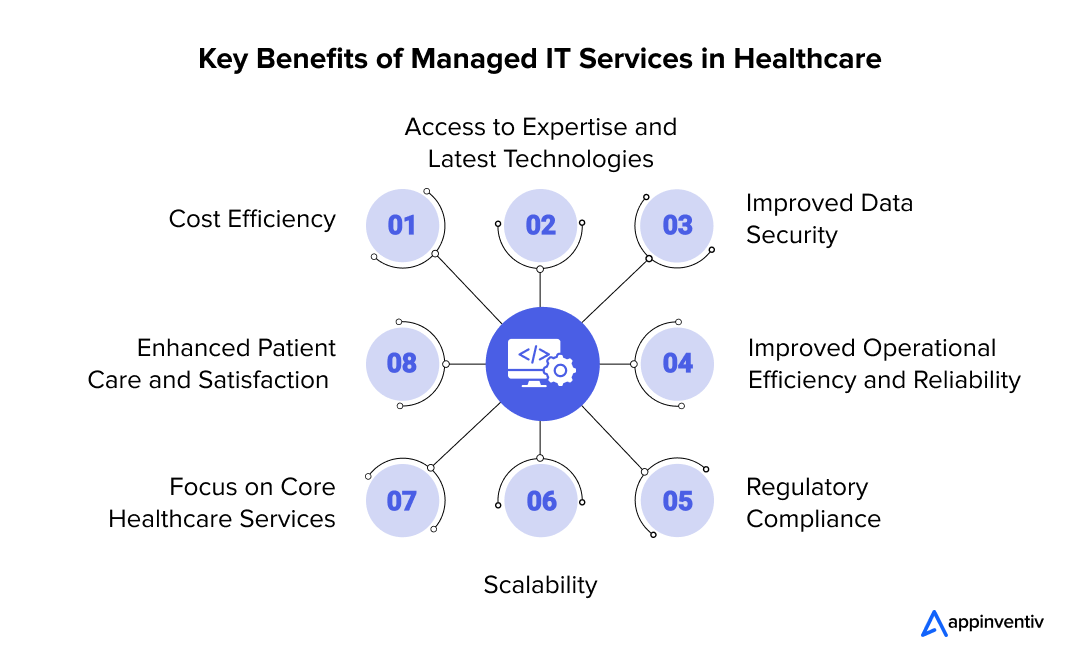
1. Cost Efficiency
Outsourcing IT activities might be less expensive than employing a large in-house IT team. Such healthcare-managed services allow health institutions to avoid the costs of hiring, training, and retaining IT staff and instead pay for what they need.
2. Access to Expertise and Latest Technologies
Healthcare practitioners have access to top IT services for the healthcare industry. This is particularly important for organizations that do not have the resources to support internal IT specialists.
3. Improved Data Security
By utilizing managed IT services for healthcare providers, you can guarantee the safety of your data against cyber threats. In addition, these services manage systems on an active basis, conduct risk analyses, and implement measures for protecting patient and hospital data.
4. Improved Operational Efficiency and Reliability
IT services for healthcare streamline workflows, automate repetitive tasks, and reduce interruptions. This enables healthcare personnel to concentrate more on patient care.
5. Regulatory Compliance
Healthcare organizations must consider healthcare compliances and certain standards, such as HIPAA. Healthcare IT managed services ensure that your IT infrastructure meets these important standards, helping you avoid expensive penalties and legal complications.
6. Scalability
IT requirements rise in parallel with healthcare demands. Managed IT services healthcare providers deliver adaptable solutions that can expand alongside your organization, guaranteeing your systems can manage increasing data volumes and patient numbers.
7. Focus on Core Healthcare Services
By delegating IT management, healthcare workers can concentrate on delivering quality care to patients instead of handling IT problems.
8. Enhanced Patient Care and Satisfaction
Consistent medical managed services minimize system outages, guaranteeing that patient records, appointments, and diagnostic information are easily accessible, enhancing the overall patient experience.
10 Use Cases of Managed IT Services For Healthcare
The healthcare industry is noticeably relying on technologically advanced IT systems and medical devices to increase efficiency and patient care and meet regulatory standards. Healthcare managed IT services have now become mandatory for healthcare providers to assist in properly functioning these systems.
Here are 10 important use cases of managed IT services for healthcare that offer comprehensive benefits.
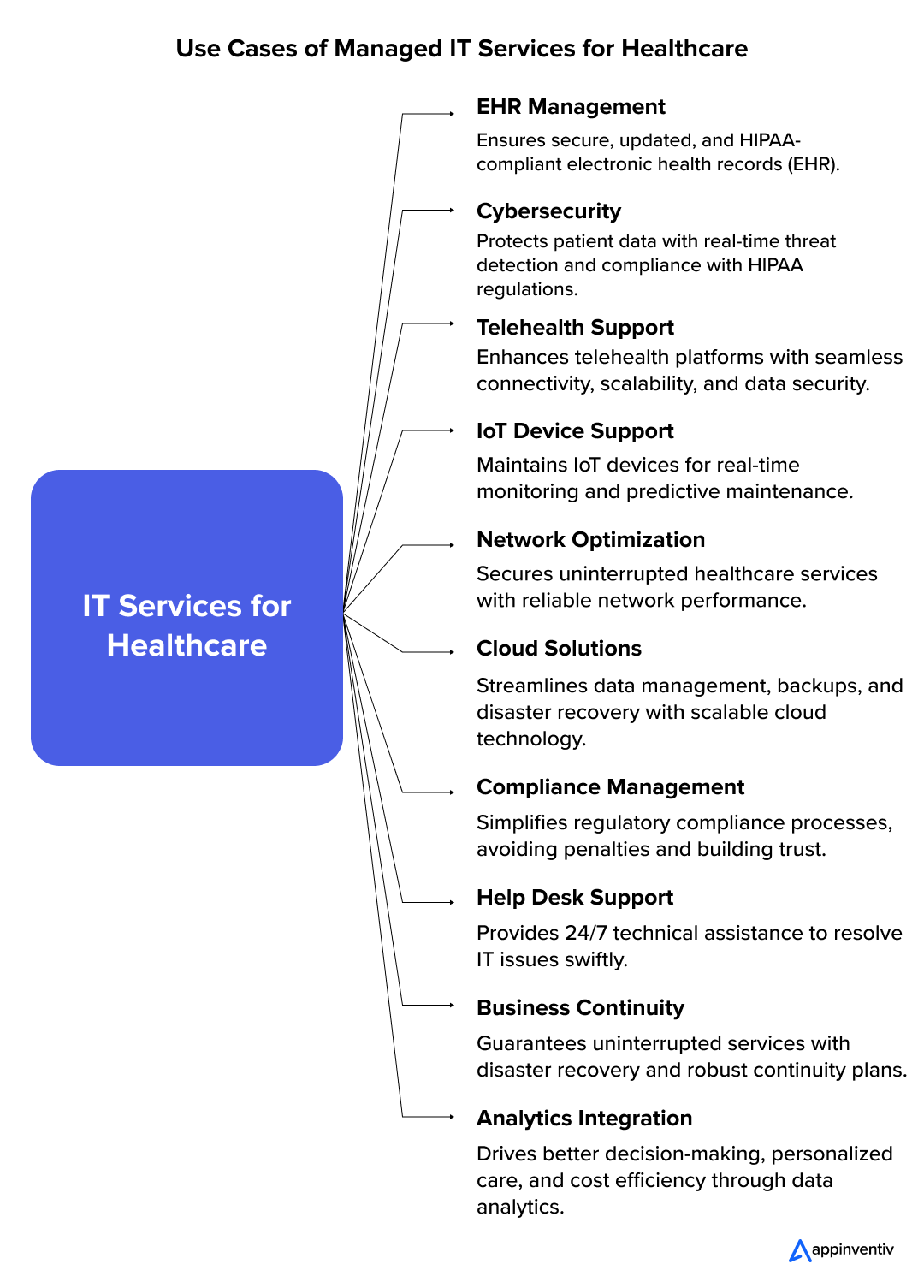
1. Management of Electronic Health Records (EHR)
Clarification of EHR and Its Importance
EHR (electronic health records) or the recording of patients’ medical history are stored data that digitally record a patient’s diagnosis, treatment, medication, tests, and results. Nowadays, such medical records are of great concern to practitioners as they help make it far easier to retrieve data about patients to be securely accessed and shared by the providers of the services.
Role of Managed IT Services
As discussed above, managed IT services in healthcare are in high demand, particularly for the maintenance and security of EHR systems, which are indeed installed systems. They ensure that the software is up to date, that regular backups are carried out, and that the system is properly configured. These services help in minimizing system downtime and thwarting potential threats.
Benefits
- Minimized Interruption: Hospital managed services reduce interruptions to EHR systems, guaranteeing that healthcare providers maintain uninterrupted access to patient records.
- Enhanced Data Precision: Frequent system updates and maintenance avoid data inconsistencies, guaranteeing trustworthy patient information.
- Adherence to HIPAA: Managed IT support for healthcare guarantees that EHR systems comply with HIPAA regulations, safeguarding patient privacy and minimizing the risk of penalties.
2. Cybersecurity and Data Protection
Threats in the Healthcare Sector
The healthcare sector is a major target for cyberattacks, such as ransomware and data breaches, because of the sensitive character of patient information. Such attacks can significantly harm a hospital’s reputation and result in substantial regulatory penalties.
Role of Managed IT Services
Healthcare managed IT services offer proactive cybersecurity in healthcare, including real-time threat detection, routine software updates, and data encryption to defend against cyberattacks.
Benefits
- Enhanced Patient Data Security: Managed IT services safeguard patient information through sophisticated security measures.
- Regulatory Compliance: Services guarantee that security measures comply with industry standards such as HIPAA.
- Reputation Management: Managed IT services help preserve the confidence of patients and stakeholders by averting data breaches.
3. Telehealth Infrastructure Management
Expansion of Telehealth
Telehealth has emerged after the COVID-19 pandemic. It depends on trustworthy IT systems for video consultations, electronic prescriptions, and safe data sharing.
Role of Managed IT Services
Overseeing IT support for telehealth guarantees uninterrupted connectivity, cloud solutions, and data protection, enhancing the accessibility and dependability of virtual care.
Benefits
- Smooth Patient-Doctor Interactions: Managed IT services guarantee that telehealth platforms remain stable and experience few technical interruptions.
- Minimized Technical Disruptions: IT assistance for telehealth mitigates challenges such as connectivity issues and improves the patient experience.
- Scalability: With the rise in demand for telehealth, managed IT services offer the necessary scalability to support expansion.
4. IT Support for Medical Devices
Incorporation of IoT in Healthcare
Incorporating Internet of Things (IoT) devices in healthcare, including wearable technology and remote monitoring systems, has revolutionized patient care. Nevertheless, these devices need ongoing IT assistance for proper function and security.
Function of Managed IT Services
Managed IT services guarantee IoT devices are safely linked to healthcare networks, allowing for real-time data transmission. They additionally offer predictive maintenance to prevent equipment breakdowns.
Benefits
- Improved Patient Care: Ongoing surveillance through IoT devices enhances patient results by delivering immediate information about their status.
- Predictive Maintenance: Managed IT services assist in detecting possible problems before they impact device efficiency.
- Improved Device Reliability: Routine upkeep guarantees that medical devices function at peak performance.
5. Network Optimization and Support
Importance of Reliable and Secure Networks
Hospitals and clinics depend significantly on IT networks to support communication, manage patient records, and perform other healthcare procedures. A network outage can interrupt operations and adversely affect patient care.
Function of Managed IT Services
Managed IT services provide network optimization, monitoring, and issue resolution, aiding in the upkeep of a swift and secure connection.
Benefits
- Enhanced Communication: A reliable and efficient network improves interaction among healthcare professionals, minimizing delays in patient treatment.
- Decreased Downtime: Active network monitoring averts disruptions, guaranteeing uninterrupted healthcare services.
- Better Patient Outcomes: A dependable network guarantees that essential healthcare applications operate seamlessly, resulting in superior outcomes.
6. Cloud Solutions for Healthcare
Migration and Management of Healthcare Data
Healthcare providers are progressively embracing the cloud for data management and storage because of its scalability and cost-effectiveness.
Function of Managed IT Services
Managed IT services assist healthcare organizations in transferring their data to secure cloud platforms, overseeing cloud-based applications, and establishing disaster recovery solutions.
Benefits
- Cost Efficiency: Cloud computing in healthcare decreases the necessity for costly physical infrastructure and enhances budget control; therefore, the cost of managed IT services in healthcare can help lower financial expenditures.
- Scalability: When the requirements of the healthcare service change, there is an allowance for rapid adjustment of the cloud services.
- Reliable Data Backup: Incorporating the cloud eliminates data loss since it provides excellent data backups.
7. Compliance Management
Healthcare Regulatory Mandates
Healthcare organizations must abide by specific frameworks like HIPAA to protect information and ensure security.
Function of Managed IT Services
Managed IT services help healthcare providers become compliant by performing audits, reporting, and implementing security measures per the law.
Benefits
- Avoidance of Penalties: Compliance management assists healthcare providers in steering clear of substantial penalties for regulatory breaches.
- Enhanced Trust: Industry compliance emphasizes trust from patients, stakeholders, and regulatory bodies.
- Streamlined Procedures: Managed IT services help ease the processes of adhering to compliance requirements, enabling healthcare service providers to keep pace with compliance.
8. Help Desk and Technical Support
24/7 IT Support
Healthcare organizations frequently need ongoing IT assistance to address technical problems related to systems, devices, and software.
Role of Managed IT Services
Managed IT services provide round-the-clock help desk assistance for healthcare personnel, ensuring technical issues are swiftly resolved to prevent interruptions.
Benefits
- Minimized Operational Hurdles: Rapidly addressing IT challenges enables healthcare organizations to sustain seamless operations.
- Faster Solutions: Healthcare personnel can obtain prompt technical support, reducing downtime.
8. Business Continuity and Disaster Recovery
Importance of Uninterrupted Healthcare Services
Healthcare services must continue to operate even during emergencies. The unexpected interruptions can significantly impact patient care and safety.
Role of Managed IT Services
Managed IT services offer disaster recovery strategies, backup options, and business continuity plans to guarantee that healthcare operations can quickly restart in case of failure.
Benefits
- Reduced Downtime: Backup systems and disaster recovery plans guarantee that healthcare services continue to function during emergencies.
- Data Recovery Guarantee: Managed IT services to ensure data recovery, safeguarding against data loss during emergencies.
- Operational Resilience: A robust continuity strategy enhances an organization’s capacity to bounce back from unforeseen circumstances.
9. Analytics and Business Intelligence
Leveraging Data for Patient Care
Data analytics plays a crucial role in healthcare by enhancing decision-making, forecasting patient outcomes, and streamlining operations.
Role of Managed IT Services
Managed IT services assist data analytics tools and business intelligence in healthcare, allowing healthcare providers to utilize patient data efficiently.
Benefits
- Improved Decision-Making: With the help of analytical tools, healthcare personnel can make better choices, increasing the quality of the treatment given to patients and operational effectiveness.
- Personalized Care of Patients: Analytics can identify useful trends and patterns when changing specific care plans is needed.
- Reduction of Costs: Data available can assist healthcare institutions in reducing costs and improving resource allocation.
Managed IT services increase system efficiency, security, and compliance, which benefits healthcare. Reducing downtime, safeguarding private information, and streamlining processes enable healthcare professionals to concentrate on providing high-quality patient care while upholding operational excellence. These services guarantee that healthcare IT systems operate at their best, promoting organizational objectives and patient outcomes.
Real-World Examples of Managed IT Services in Healthcare
The following are examples of companies offering IT outsource services for the healthcare industry. These companies bring in the right mix of professionalism and technical knowhow to address the peculiar needs of the healthcare industry, including but not limited to compliance, security, and effectiveness:
1. YouCOMM LLC
Managed IT Partner
Appinventiv Healthcare IT
Use Case
- YouCOMM is a multi-request format platform for in-hospital patients to connect with nurses to get help for their basic needs.
- With the help of their IT partner Appinventiv, the fully customizable patient messaging system lets patients notify the staff of their needs by manually selecting options, voice commands, and head gestures.
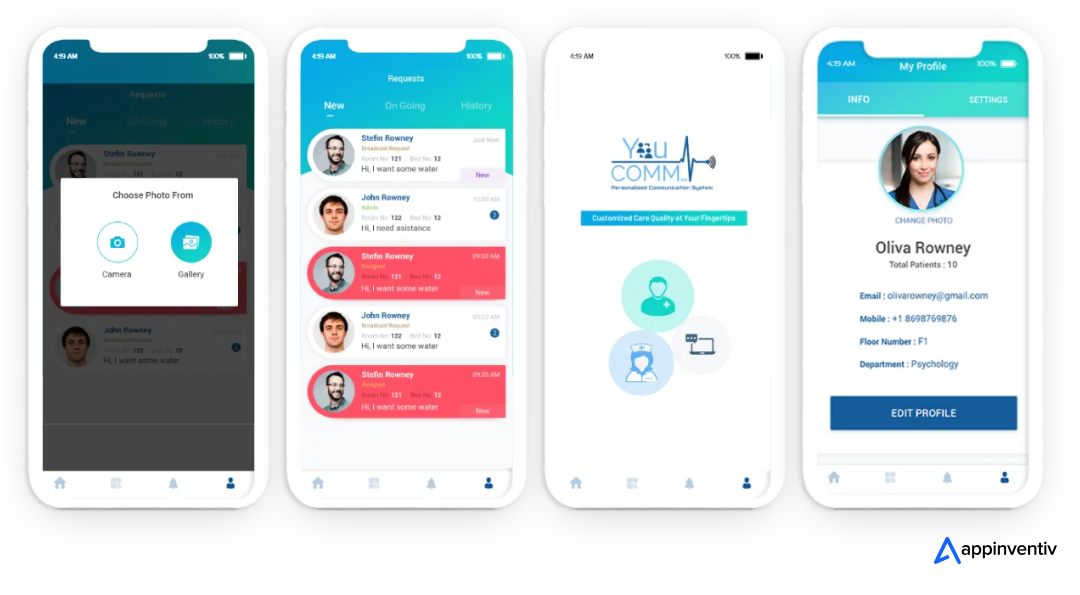
Outcome
The product has been launched at a beta level in some hospitals, and the managing partner of YouCOMM LLC is constantly working on innovating it further for its mass rollout. Even at a beta stage, YouCOMM has received much positive media recognition.
The app was awarded the CT Bioscience Innovation Fund in 2019 and an Entrepreneurs Innovations Award in 2019.
- 5+ Hospital chains in the US running on the YouCOMM solution
- 60% Growth in Nurses’ Real-time Response Time
- 3+ Hospitals getting high CMS reimbursement
2. Apollo Hospitals
Managed IT Partner
Google Cloud
Use Case
- Apollo Hospitals has enhanced its collaboration with Google Cloud to transform healthcare services throughout India via its digital platform, Apollo 24|7.
- The initiative seeks to address the healthcare accessibility gap in India, particularly in underserved rural regions.
Outcome
- Improved Healthcare Access: Provided telehealth services, virtual physician consultations, and medication delivery to marginalized areas.
- Transformed Patient Engagement: Enhanced clinical decision-making and care delivery through AI-driven tools.
- Operational Efficiency: Attained scalability and dependability in overseeing India’s largest healthcare platform.
This collaboration between Apollo Hospitals and Google Cloud illustrates how managed IT services can revolutionize healthcare, enhancing its accessibility, efficiency, and focus on patients.
3. Mayo Clinic
Managed IT Partner
IBM Watson Health
Use Case
- Collaborated with IBM for AI-driven data analytics and predictive insights.
- Established managed IT solutions for extensive electronic health record (EHR) management.
Outcome
- Enhanced decision-making through predictive analytics for patient treatment.
- Improved IT efficiency, enabling healthcare providers to concentrate on patient results.
4. NHS (National Health Service), UK
Managed IT Partner
Accenture
Use Case
- Collaborated with Accenture to upgrade outdated IT systems.
- Implemented managed IT solutions to enhance interoperability among healthcare facilities.
Outcome
- Fluid unification of health records among hospitals.
- Enhanced security of patient data and adherence to GDPR.
Key Considerations for Choosing a Managed IT Service Provider
Choosing the appropriate partner for IT services in healthcare is essential to guarantee smooth operations, compliance, and scalability within the healthcare sector. Here are the key elements to assess:
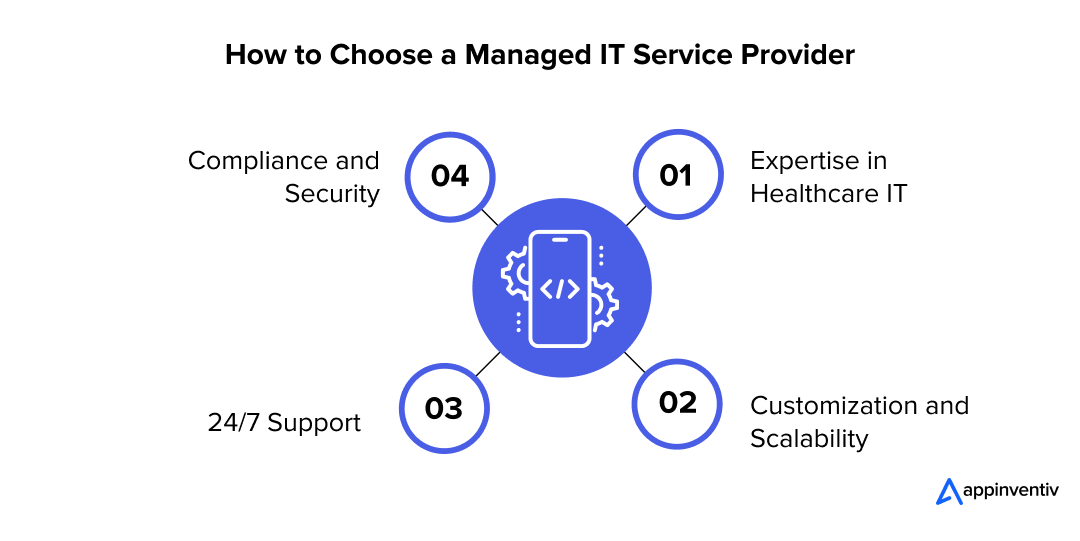
1. Expertise in Healthcare IT
Healthcare is a distinct sector with specific IT requirements. The service provider must fully grasp IT services tailored to the healthcare sector and its regulatory environment, encompassing standards such as HIPAA, GDPR, or local health compliance regulations.
Experience with integrating advanced healthcare technologies like electronic health records (EHRs), telemedicine trends and systems, and AI-powered diagnostics is a substantial benefit. Experts in managed healthcare services are more capable of providing solutions that meet the industry’s stringent standards.
Pro Tip: Ask for case studies or testimonials to evaluate the provider’s experience with comparable healthcare organizations.
2. Customization and Scalability
No two healthcare providers are the same. Seek managed healthcare IT services that provide adaptable solutions for your organization’s unique requirements, whether a small clinic or a large hospital network. Scalability is also vital; as your business expands or technology progresses, the provider must guarantee that the IT infrastructure can scale smoothly without major interruptions.
Pro Tip: Assess the provider’s capacity to incorporate new technologies, like BPM Healthcare and IoT devices for remote patient tracking or sophisticated analytics to enhance care results.
3. 24/7 Support
Healthcare systems need to function perfectly without exception. Any period of inactivity could affect patient treatment, resulting in serious outcomes. Reliable IT-managed healthcare services must provide 24/7 monitoring and assistance to swiftly resolve technical problems, reducing downtime and guaranteeing continuous operations.
Pro Tip: Verify the provider has a strong service-level agreement (SLA) that assures your company’s response times and resolution standards.
4. Compliance and Security
Healthcare organizations handle large quantities of sensitive patient information, making adherence to regulations and cybersecurity essential. A reliable managed IT support provider for healthcare will focus on adhering to healthcare regulations and establishing robust cybersecurity measures. This encompasses strong data encryption, secure access protocols, and frequent security audits to safeguard against breaches and ransomware threats.
Pro Tip: Ensure that the provider keeps current with the newest trends in healthcare IT services management to tackle new cybersecurity threats efficiently.
Ready to supercharge your healthcare IT? If you want to add custom features or functionalities to your healthcare software, hit us up for a personalized quote and chat with our dev pros!
Selecting the appropriate healthcare IT consulting services provider allows your organization to concentrate on providing outstanding patient care while depending on safe and effective IT infrastructure. Perform comprehensive research, inquire appropriately, and prioritize collaborators with a demonstrated history in healthcare IT services.
Appinventiv: Building a Smarter, Safer Healthcare System
Managed IT services allow healthcare organizations to navigate complex IT ecosystems relatively easily, from operational efficiency to improved patient outcomes. Providers can, therefore, reduce costs, improve security, ensure regulatory compliance, and focus more on delivering excellent patient care by embracing these services.
We at Appinventiv are completely aware of the various opportunities and challenges of managed IT services for healthcare. As a leading IT Services and Consulting provider, we help organizations embrace the latest technologies, enhance cybersecurity, and optimize operations for seamless functioning.
With a proven history of revolutionizing healthcare IT systems, Appinventiv is your trusted partner in building a smarter and safer healthcare ecosystem. Stay ahead of the curve by delivering exceptional care in the digital-first world. Let’s transform your healthcare IT today—partner with us for solutions that place innovation and care at the center.
FAQs
Q. What is MSP in healthcare?
A. An MSP (Managed Service Provider) in healthcare is an external organization responsible for managing and supporting a healthcare facility’s IT infrastructure and services. Their duties include network monitoring, data security, cloud management, and ensuring compliance with healthcare regulations such as HIPAA. Managed IT services for healthcare enable healthcare providers to maintain efficient and secure IT operations, allowing them to concentrate on delivering quality patient care.
Q. Why do you need managed IT services for your health system?
A. Managed IT services help healthcare systems stay on top of their IT needs by providing proactive management, stronger cybersecurity, and effortless compliance with industry regulations. These services improve efficiency, minimize downtime, and ensure smooth handling of patient data. Partnering with a healthcare managed service provider allows healthcare organizations to tap into advanced technologies, cut costs, and stay competitive.
Q. Why do healthcare CIOs need managed IT services?
A. Here are some of the reasons why healthcare CIOs require managed IT services:
- Drive digital transformation
- Optimize IT costs
- Provide expert support and proactive monitoring
- Ensure compliance with healthcare regulations
- Manage cybersecurity risks effectively
- Keep IT infrastructure up-to-date
- Enable scalability and flexibility
- Enhance patient care delivery


- In just 2 mins you will get a response
- Your idea is 100% protected by our Non Disclosure Agreement.

Why Partnering with an IT Consulting Company in Dubai is Essential for Your Business
Dubai's rapid evolution into a global business hub is a testament to its strategic digital transformation initiatives, many of which have been propelled through IT outsourcing partnerships. In recent years, the UAE's technology sector has experienced significant growth, driven by ambitious government programs such as the Dubai 10X initiative and the UAE Artificial Intelligence Strategy…

10 Business-Critical Benefits of Managed Security Services
Every business today, regardless of size or industry, operates in a digital battlefield. Cyber threats are evolving at an unprecedented pace, outstripping the capabilities of traditional security measures. A single breach can trigger financial losses, operational disruptions, reputational damage, and regulatory penalties - impacts that extend far beyond IT teams and into the core of…

Managed IT Services for Manufacturing - An Explorative Guide for CIOs
Key takeaways: The IT services provided can maximize production process efficiency through proactive monitoring, reduced downtime, and faster operations. Latent cybersecurity safeguards correspond to the intellectual assets and intelligence within the business relating to business continuity in a virtual reality. With fixed-price models, unforeseen IT costs are eliminated, allowing for the consolidation of resources and…






